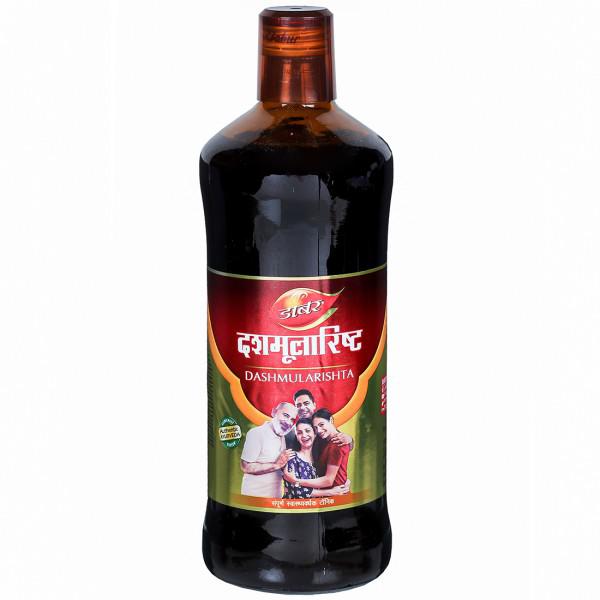
Ingredients of Dabur Dashmularishta:
Dabur Dashmularishta is typically made from a blend of ten medicinal roots, which is why it’s called “Dashmularishta.” The specific composition of herbs can vary slightly between different manufacturers, but the common ingredients include:
- Bilva (Aegle marmelos)
- Agnimantha (Premna integrifolia)
- Shyonaka (Oroxylum indicum)
- Patala (Stereospermum suaveolens)
- Kashmari (Gmelina arborea)
- Bruhati (Solanum indicum)
- Kantakari (Solanum xanthocarpum)
- Gokshura (Tribulus terrestris)
- Shalaparni (Desmodium gangeticum)
- Prishniparni (Uraria picta)
These herbs are traditionally known for their health-promoting properties, especially in the context of women’s health and postpartum recovery.
Preparation of Dabur Dashmularishta:
Dabur Dashmularishta is prepared through a fermentation process. The herbs are soaked in water and then decocted (boiled to extract their active compounds). This decoction is then fermented using jaggery (unrefined sugar) and specific microorganisms that convert the sugars into alcohol and generate a variety of active compounds from the herbs. This fermentation process is believed to enhance the bioavailability and efficacy of herbal constituents.
Benefits of Dabur Dashmularishta:
Dabur Dashmularishta is traditionally used to address various women’s health issues, including:
- Postpartum Recovery: It is believed to support the recovery of the uterus and promote overall strength and vitality in the postpartum period.
- Uterine Tonic: The blend of herbs in Dashmularishta is thought to have a toning and rejuvenating effect on the uterus and female reproductive system.
- Strength and Stamina: It is often used to boost energy levels, improve stamina, and alleviate fatigue.
- Gynecological Issues: Dashmularishta is believed to help manage various gynecological issues like irregular menstruation, menstrual cramps, and hormonal imbalances.
- Digestive Health: Some of the herbs in the formulation have digestive benefits and can help improve digestion and absorption of nutrients.
Dosage: The recommended dosage of Dabur Dashmularishta can vary based on individual factors and the specific condition being treated. Generally, it’s taken in a dose of about 15-30 ml, usually mixed with an equal amount of water, after meals.
Note: Always consult a qualified healthcare practitioner or Ayurvedic physician before starting any new herbal preparation. While Ayurvedic remedies can have benefits, individual responses can vary, and it’s important to ensure that the chosen remedy is appropriate for your specific health condition and constitution.

Leave a Reply